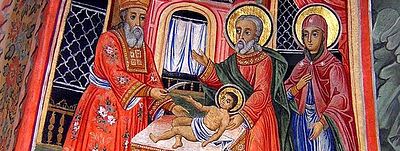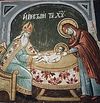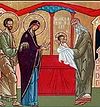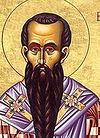

| Previous day | Next day |
| Old Style
January 1
|
Sunday |
New Style
January 14
|
| 32nd Sunday after Pentecost. Sunday before the Theophany. Tone 7. | No fast.
|
![]() The Circumcision of Our Lord Jesus Christ
The Circumcision of Our Lord Jesus Christ
![]() St. Basil the Great, archbishop of Caesarea in Cappadocia (379).
St. Basil the Great, archbishop of Caesarea in Cappadocia (379).
Martyr Basil of Ancyra (ca. 362) St. Emilia, mother of Sts. Macrina, Basil the Great, Naucratius, Peter of Sebaste, and Gregory of Nyssa (4th c.). St. Athanasius, wonderworker of Poltava, bishop of Mogilev and Polotsk (1801).
New Monk-martyr Jeremiah (Leonov) of Valaam (1918). New Hieromartyrs Platon (Kulbush), bishop of Revel, Estonia, and archpriests Michael Bleive and Nicholas Bezhanitsky (1919), and Alexander (Trapitsyn), archbishop of Samara (1938).
St. Gregory, bishop of Nazianzus, father of St. Gregory the Theologian (374). St. Eugendus, abbot of Condat in the Jura Mountains (510). St. Fanchea of Killeany (Ireland) (ca. 520). St. Fulgentius, bishop of Ruspe in North Africa (533). St. Clarus, abbot of St. Marcellus Monastery in Vienne (Gaul) (ca. 660). New Martyr Peter of Tripolis in the Peloponnese, at Temisi in Asia Minor (1776).
Repose of Sergius A. Nilus, spiritual writer (1929), Nun Faina of Starobelsk (1972), and Archimandrite Mitrophan (Manuiloff) (1986).
Thoughts for Each Day of the Year
According to the Daily Church Readings from the Word of God
By St. Theophan the Recluse

New Year’s Day. The Circumcision of the Lord. Saint Basil the Great. [Col. 2:8–12; Luke 2:20–21, 40–52].
Since New Year’s Day is the beginning of the days of the year, we ought to gather in our soul those thoughts, feelings and dispositions that would direct our affairs throughout the year in a Christian way. We will find this the moment we bring to mind what New Year’s Day is in the spiritual life. In the spiritual life, New Year’s Day is when one who has been living carelessly becomes zealous about salvation and pleasing God. When one makes this resolution, then all is rebuilt afresh both internally and externally, upon new beginnings—the old passes away and all is new. If you have this, renew it; if not, acquire it—and for you this will be New Year’s Day.
A worthy celebration of the feast of the Circumcision of the Lord and of the commemoration of Saint Basil the Great are also tied with this. The essence of this change we have mentioned is that a person begins from this moment on to live solely for God, for his salvation; whereas previously he lived exclusively for himself, preparing destruction for himself. Now he abandons former habits, all comforts and all in which he found pleasure; he cuts off passions and lustful dispositions and takes on works of strict self-denial. Such a change precisely represents what, according to the Apostle, the circumcision of the heart should be. The celebration of the circumcision of the Lord reminds us of this and obligates us to do it, while St. Basil the Great provides us with an example to follow. So all the themes which crowd our consciousness on New Year’s Day come together into one—our inner renewal through the circumcision of the heart. If it pleases the Lord to give someone this mindset on New Year’s Day—that is, not only to think in such a way, but also to bring all of this into his life—he will celebrate New Year’s Day in a most perfect Christian manner, and will prepare for a Christian passing of the whole year. On the following New Year’s Day he will only have to renew and enliven what he has now taken on.
Sunday Before Theophany[1] (31st). [II Tim. 4:5–8; Mark 1:1–8]
Before the Lord’s appearance to the people, before He began the work of Divine economy[2] of our salvation, Saint John the Forerunner was sent to prepare people for receiving Him. This preparation consisted in a call to repentance. Since then, repentance has become the path to the Lord and Saviour, and the threshold to faith in Him. The Saviour Himself began His preaching with the words: Repent ye, and believe the gospel (Mark 1:15). Repentance and faith lead a person who seeks salvation back and forth between these two states. Repentance weighs him down with the burden of his sins and frightens him with the impartial judgement of God’s righteousness. But faith comes along and shows him the Deliverer Who has taken away the sins of the world. He who repents cleaves to the Deliverer, and laying down the burden of his sins through confession, joyfully runs after Him along the path of His commandments. Faith in this manner is born of repentance and is founded on it. He who repents holds firmly onto faith according to his feeling of deliverance. Faith is alive through repentance. Without repentance faith would be like a sapling which is without an animating current—withered and not giving of life.
[1] Theophany, or in Russian, Bogoyavlenie, means “God has appeared.” This feast day is otherwise known as Epiphany.
[2] Throughout this book, the Russian word, domostroitelstvo, will be translated as “Divine economy,” which refers to God’s stewardship, overseeing our salvation, as a steward oversees a household. The epitome of God’s Divine economy is Christ’s incarnation, and salvation through Him.
Articles
 The Circumcision of the Lord, St. Basil the Great, and the New Year |
 Martyr Basil of AncyraSaint Basil lived in the time of Julian the Apostate (331-363), and confessed his faith in Christ before the governor Saturninus. |
 St Emilia, the Mother of St Basil the GreatSt Basil the Great’s mother St Emilia was the daughter of a martyr. On the Greek calendar, she is commemorated on May 30. |









